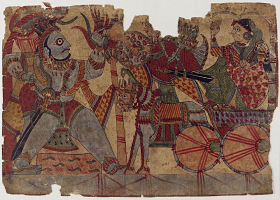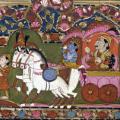13. Grand Illusion: Dharma and Deception in the Mahabharata
The great Hindu epic Mahābhārata explores moral dilemmas and the permissibilty of lying, against the background of the ethical concept of dharma.
Themes:
J.D. Smith (abridged and trans.), The Mahābhārata (London: 2009).
J.A.B. van Buitenen et al. (trans.), The Mahābhārata (Chicago: 1973-).
J. Brockington, The Sanskrit Epics (Leiden: 1998).
D. Gitomer, “King Duryodhana: the Mahābhārata Discourse of Sinning and Virtue in the Epic and Drama,” Journal of the American Oriental Society 112 (1992), 222-32.
A. Hiltebeitel, Rethinking the Mahābhārata: a Reader’s Guide to the Education of the Dharma King (Chicago: 2001).
A. Hiltebeitel, Dharma: Its Early History in Law, Religion, and Narrative (Oxford: 2011).
B.K. Matilal, Epics and Ethics (Oxford University Press, 2002) [esp ch. 4: “Elusiveness and Ambiguity in Dharma-Ethics”, ch.8: “Kṛṣṇa: In Defense of a Devious Divinity”]
B.K. Matilal, (ed.), Moral Dilemmas in the Mahābhārata (Delhi: 1989).
See also Journal of Indian Philosophy 32 (2004): a special issue devoted to dharma.

Origins


 ..
..



Comments
Duties
The Mahabharata story here seems to imply that one should reduce the duties one has to as few as possible. For example, if someone had a warrior that could beat Duryodhana, there would have been no moral dilemma. And presumably, the best way to have ensured that would be to have one who was more dedicated to their warrior dharma, and thus was more practiced in the art of combat. Likewise, Yudhistira had a moral dilemma because he had two dharmas, one familial, the other to the truth. To save one, he has to effectively choose to give up the other at least as an absolute. Likewise, if one were to try to be too many things, they would constantly conflict with one another, sometimes in major ways (like in the story), but subtly also all the time as we can not devote 100% of our attention. I was wondering, do the Vedas, Upanishads, or Mahabarata explicitly draw attention to this to explicitly embrace (or contradict) this implicit conclusion?
In reply to Duties by Alexander Johnson
Duties/dharmas
That's a nice point. My impression is that it is usually assumed in these earlier Vedic-tradition texts that one finds oneself having certain dharmic roles, rather than optionally selecting them. So for instance in the Gita it is taken for granted that Arjuna has the warrior role to play, and the question is whether he is going to step up and fulfil it or not; I mean, he does consider abandoning his duty and becoming a renouncer, but I think even Arjuna himself frames that as a refusal to do his dharmic duty rather than as embracing an alternative dharmic duty. If this is right then it is a matter of fate/luck/karma what your dharma(s) is/are, not a result of your choices, at least in this life.
Appreciation
This is very insightful, I had great pleasure in listening to it. Thank you,
parallel theme in Old Testament
I was fascinated that the same quandary, or more accurately the same moral choice, over truth telling is found in the books of Exodus and in I Kings 22. The Hebrew midwives lie to Pharaoh and are rewarded by God for doing so. In I Kings 22, God sent a lying spirit among the prophets to entice Ahab into battle but then God has one prophet admit to the lie and warn Ahab that the lies are just a ruse God is using to get him to go into battle. And so Ahab goes into battle anyway. It is presented as less of a moral quandary in the Hebrew scriptures, and more as an acceptable choice. There is also an account in the NT in which Jesus apparently lies. (John 7:8-10).
Add new comment